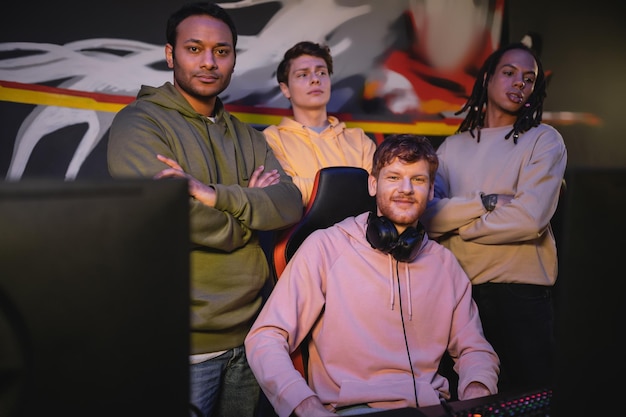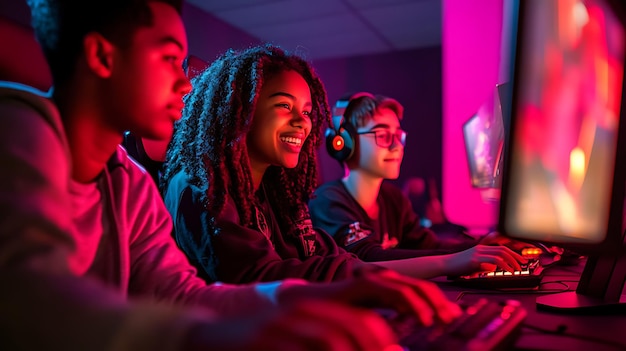Professional Game Development Training
Comprehensive programs designed to build specialized skills in multiplayer systems, virtual economies, and immersive technologies
Back to Home
Our Training Approach
PlayForge courses are structured around practical implementation and portfolio development. Each program combines theoretical foundations with extensive hands-on work, ensuring participants develop both understanding and applicable skills. Our methodology emphasizes building competency through progressive challenges that mirror real development scenarios.
Instruction is delivered by developers with direct industry experience who understand the practical challenges of production environments. Course content reflects current tools, frameworks, and methodologies used in professional game development, providing training that translates directly to workplace application.
Throughout each program, participants complete projects that demonstrate their growing capabilities. These portfolio pieces serve dual purposes: reinforcing learning through practical application while creating concrete evidence of skills for career advancement opportunities. Projects are designed to showcase not just technical implementation but also problem-solving approaches and architectural thinking.

Multiplayer Game Architecture
Design and implement robust multiplayer systems for competitive and cooperative gaming experiences. This program covers network programming fundamentals, client-server architecture, and peer-to-peer implementations.
What You'll Learn
- Network programming fundamentals and protocols
- Lag compensation and prediction techniques
- Server authoritative models and anti-cheat systems
- Matchmaking algorithms and lobby systems
- Real-time synchronization and packet optimization
Course Projects
Implement battle royale networking, create ranked matchmaking systems, and build cross-platform multiplayer support
Game Economy Design
Create balanced and engaging virtual economies that drive player retention and monetization. This course covers currency systems, resource flows, and pricing psychology for games.
What You'll Learn
- Currency systems and resource flow design
- Free-to-play mechanics and ethical monetization
- Battle pass design and seasonal content strategies
- Inflation control and sink-faucet balance
- Player progression curves and retention modeling
Course Projects
Design currency systems, balance item shops, and create monetization forecasts for various game types


VR/AR Game Development
Build immersive experiences for virtual and augmented reality platforms using cutting-edge technology. This comprehensive program covers VR fundamentals, motion sickness mitigation, and comfort design principles.
What You'll Learn
- VR fundamentals and motion sickness mitigation
- Hand tracking and spatial audio implementation
- Locomotion systems and comfort design
- AR marker detection and persistent cloud anchors
- Development for Meta Quest, HoloLens, and mobile AR
Course Projects
Create VR training simulations, AR location games, and mixed reality experiences across multiple platforms
Course Comparison
Compare our programs to find the right fit for your development goals
| Feature | Multiplayer Architecture | Game Economy | VR/AR Development |
|---|---|---|---|
| Investment | ¥58,000 | ¥46,000 | ¥64,000 |
| Primary Focus | Network Systems | Monetization Design | Immersive Tech |
| Target Roles | Network Engineer | Economy Designer | XR Developer |
| Technical Level | Advanced | Intermediate | Advanced |
| Math Requirements | High | Moderate | High |
| Portfolio Projects | 3 Networking Systems | 2 Economy Models | 3 XR Experiences |
Selecting Your Course
Choose Multiplayer If:
- • Strong programming background
- • Interest in competitive gaming
- • Network systems fascinate you
- • Backend development experience
Choose Economy If:
- • Design-focused mindset
- • Interest in player psychology
- • Free-to-play games interest you
- • Analytics background helpful
Choose VR/AR If:
- • 3D development experience
- • Interest in emerging tech
- • Spatial thinking comes naturally
- • Hardware access available
Technical Standards and Protocols
Development Practices
All courses emphasize professional development standards including version control with Git, code documentation practices, and testing methodologies. Participants learn to write maintainable code that facilitates team collaboration.
We incorporate code review processes and debugging techniques used in production environments, preparing developers for professional workflows.
Performance Optimization
Each program includes training on profiling tools, performance measurement, and optimization strategies specific to the course domain. Participants learn to identify bottlenecks and implement efficient solutions.
Memory management, CPU optimization, and network efficiency are covered as relevant to each specialization.
Cross-Platform Development
Programs address platform-specific considerations and cross-platform development strategies. Participants learn to handle different hardware capabilities and operating system requirements.
Build pipelines, platform deployment, and cross-platform testing approaches are integrated throughout coursework.
Quality Assurance
Testing strategies, bug tracking, and quality assurance processes are incorporated into project work. Participants develop habits of thorough testing and documentation.
Edge case handling, error management, and graceful degradation principles are emphasized throughout implementation work.
Professional Tools and Technology
Development Environments
Participants work with industry-standard IDEs and development tools used in professional studios. This includes modern game engines, networking frameworks, analytics platforms, and XR development kits.
Our facility provides access to necessary hardware including VR headsets, AR devices, and development workstations. Participants gain familiarity with the full development pipeline from ideation through deployment.
Technical Infrastructure
Course projects utilize professional networking infrastructure, cloud services, and deployment platforms. This hands-on experience with production-grade systems prepares participants for workplace environments.
Training includes exposure to monitoring tools, analytics dashboards, and backend services commonly used in live game operations. Participants understand the full technical stack supporting modern games.
Frequently Asked Questions
Common questions about our training programs
What programming experience is required?
For Multiplayer Architecture and VR/AR Development, we recommend solid programming fundamentals in C++, C#, or similar languages. Game Economy Design requires less programming but benefits from scripting experience. Specific prerequisites are listed on individual course pages.
How long does each program take?
Programs typically span 8-12 weeks with both intensive and part-time schedule options available. Actual completion time varies based on prior experience and time commitment. Detailed schedules are provided during enrollment.
What equipment do I need?
A development-capable computer meeting course-specific requirements is necessary. For VR/AR Development, access to compatible hardware is required, though our facility provides equipment for in-person sessions. Full equipment lists are provided upon enrollment.
Are courses available in English?
Yes, all instruction is delivered in English. Course materials, documentation, and communication are conducted in English to prepare participants for international development environments.
Can I take multiple courses?
Yes, many participants complete multiple programs. Course sequences can be planned to build complementary skills. Discounts may be available for multiple course enrollment.
What support is available after course completion?
Alumni receive ongoing access to course materials and can participate in periodic refresher sessions. Our instructor team remains available for technical questions related to course content. We also facilitate connections within our alumni network.
Do you provide career placement services?
While we don't guarantee placement, we provide portfolio review support and maintain connections with studios in the Tokyo area and beyond. Many participants have successfully transitioned into specialized roles after completing our programs.
What is your refund policy?
Refund policies are detailed in our terms of service. Generally, partial refunds are available if withdrawal occurs within the first two weeks of a program. Specific terms are provided during enrollment.
Ready to Begin Your Training?
Contact us to discuss which program aligns with your development goals